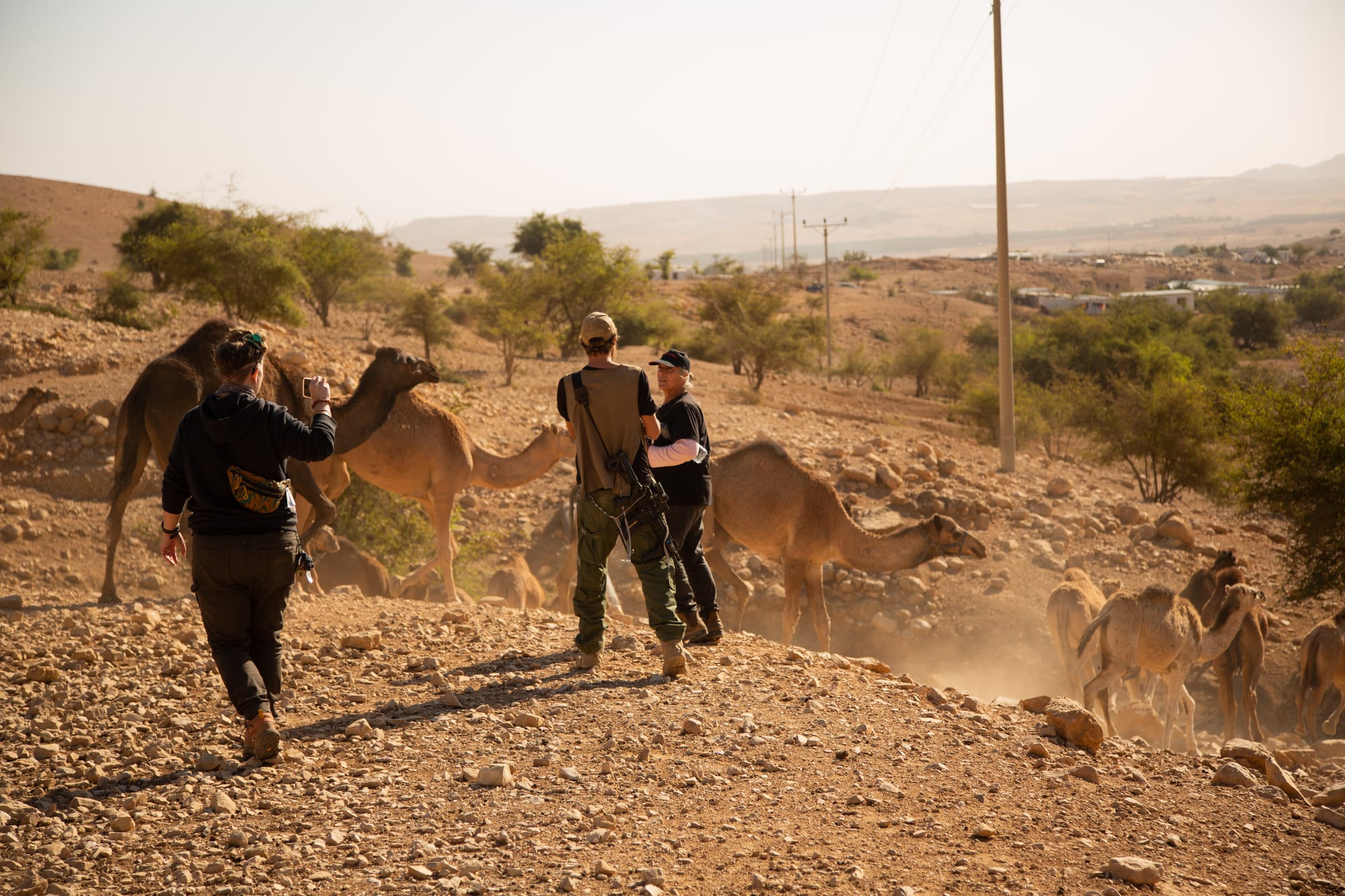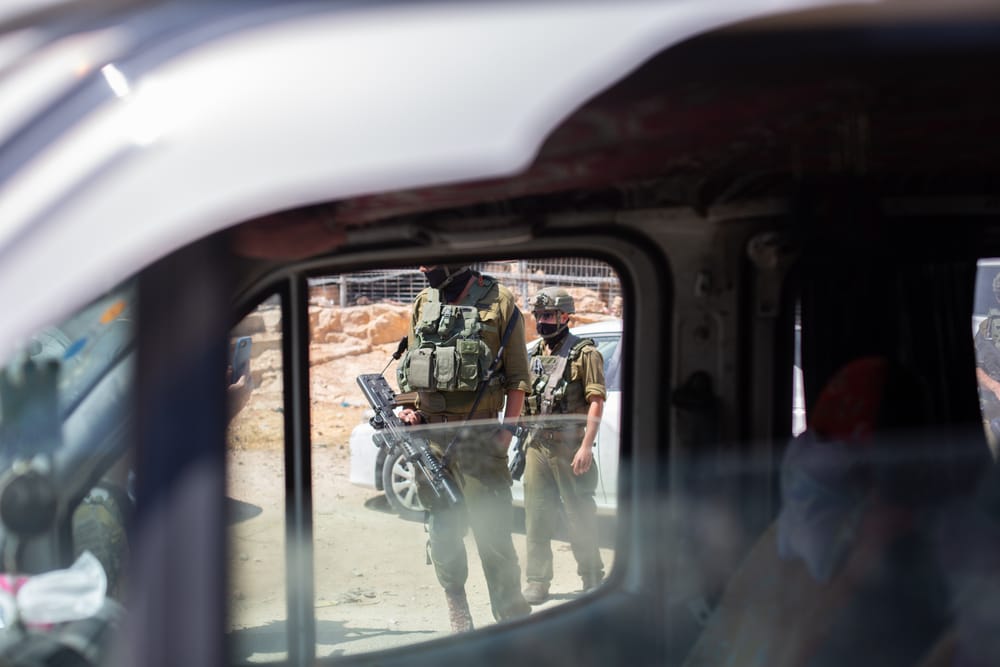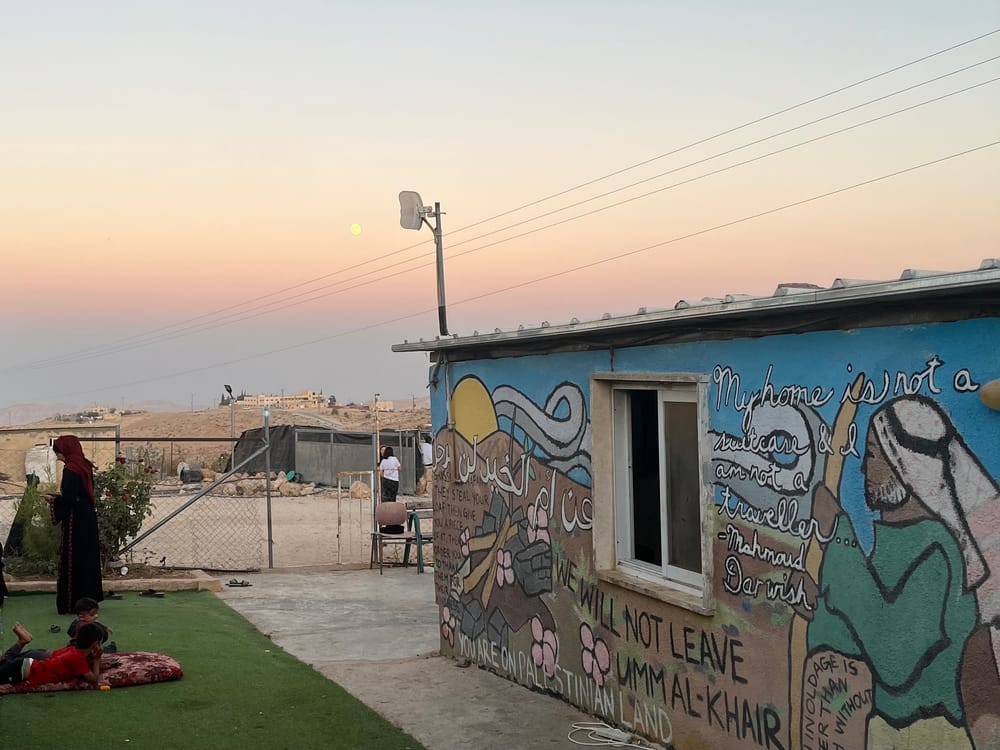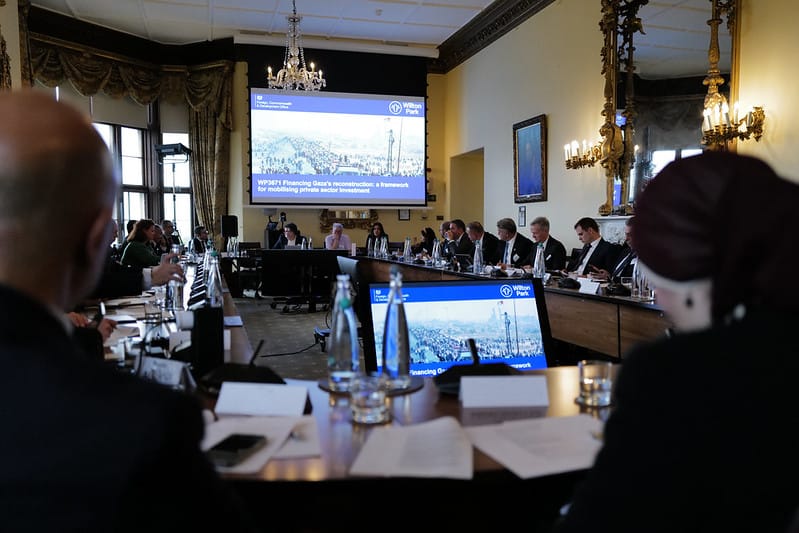Protective presence doesn’t work anymore
In the West Bank, activists struggle to make a dent in Israel's impunity.

“What are you doing here?” we ask the soldier, two phone cameras pointed at her face.
“None of your business” she answers, visibly uncomfortable, refusing to look us in the eye.
She and her brigade had shut down the main road leading through the Palestinian town of Auja in the Jordan Valley near Jericho, closing all the stores and blocking traffic. Almost immediately, a store owner in the town called us and requested we provide protective presence and record the army invasion.
This is unfortunately a common occurrence in the West Bank. The army invades a community, shuts it down, and often detains people. They justify it with abstract “security concerns”, or claim that a Palestinian threw stones at someone. The stone-throwing is usually made up, but even when it’s not, closing down the whole village as a response amounts to collective punishment — a crime that violates the Fourth Geneva Convention.
“Why did you shut down the town?” we press on. Still no response. A few minutes later, the soldiers pack up, get back into their vehicle and drive away. They don’t like being filmed when they are harassing Palestinians.
With the road clear, we also pack up and return to the Bedouin community of Ras al-Auja. We escort the community’s trucks on their way to collect water from the local stream. When Palestinians go alone, they are often attacked by settlers, who threaten them, throw stones, and try to steal their equipment. When we escort the trucks, the settlers limit themselves to filming back and shouting at us.
That was in June 2024. That was a different time. Just over a year later, settler Yinon Levy will murder Palestinian activist and teacher Awdah Hathaleen in front of a dozen international and Israeli activists filming from every direction in the Masafer Yatta village of Umm al-Kheir. A few weeks later, settlers will physically assault human rights advocates in the village of Duma in the Jordan Valley, causing visible injuries, all recorded on camera. There will be no consequences.
They no longer care that we are there.
A deterrent in theory
Protective presence has been practised in the West Bank for decades. Drawing on the pioneering work of the Peace Brigades International in Central America during the 1980s, similar initiatives launched in Palestine after Zionist terrorist Baruch Goldstein massacred 29 Palestinians in Hebron in 1994. The programmes expanded during the Second Intifada, and by 2004 there were several functioning organisations, many of which operate in the West Bank to this day – including Ta’ayush, the International Solidarity Movement, and Rabbis for Human Rights.
The idea is to leverage the privilege of an international or Israeli passport against settlers and soldiers by placing ourselves between them and the Palestinians they attack and harass. Unlike Palestinians in the West Bank, Israelis and internationals are subject to civilian rather than military law. Under this military law, Palestinians are frequently kidnapped by the army and held without charges at Israel’s concentration camps. In stark contrast, Israeli and international activists have to be presented in front of a court within 24 hours of arrest, receive immediate access to lawyers, and generally don’t remain detained for longer than a couple of days. Due to our links to international governments and media outlets, settlers and soldiers run the risk of widespread attention and condemnation if they attack us — at least in theory. In practice, it’s not always a deterrent, as we know from the cases of Rachel Corrie, Tom Hurndall, and more recently Ayşenur Ezgi Eygi.
On a daily basis, the co-resistance work of activists includes accompanying Palestinian shepherds while they are grazing their sheep; walking with children to school and back; recording abuses near checkpoints; and staying overnight in vulnerable communities where a pogrom is feared to happen. The vast majority of the time it’s a waiting game because the situation can escalate any moment.
In these early decades, protective presence initiatives saw some success. In 2002, for example, the residents of Yanun, expelled from their land by a movement of young settlers known as the Hilltop Youth, managed to return with support from international and Israeli activists.
The rise of cheap cameras, then phones and social media, has arguably provided more protection from violence than a bulletproof vest. It’s also made protective presence more effective as we don’t need to rely on hearsay when settlers or soldiers attack. Everything is recorded.
There was a time not long ago when merely showing up with a camera could stop violence. Last summer, I drove with other activists to the Auja stream where a settler kid armed with a stick was approaching a Palestinian water truck. He was poised to attack the driver, as the settlers there had done many times before. I jumped out of the car with a phone pointed at the settler, and he immediately pulled back.
But even then, the situation had started to change. A few days later, a different settler trying to prevent Palestinians from getting water from the stream wrestled with me and another activist. The settler was happy to physically attack us in front of several cameras. A month later at the same stream, a settler named Yehuda Friedman hit me on the head with a stick, piercing my ear drum, impairing my hearing for the next two months, and dealing some permanent damage. The settlers stopped flinching at the sight of a phone.
By now, the settlers have won their battle over the Auja spring; the villagers don’t dare approach it.
The void where accountability should be
For Palestinians, the reduced viability of protective presence has directly contributed to a lack of access to water, the loss of their livelihood, and a dramatic increase in pogroms. In the Jordan Valley, Palestinian life is being erased. The villagers of Mu’arajat had to abandon their homes earlier this year. Ras Ein al-Auja is the last village standing in the south Jordan Valley, but even there many families have been forced to flee.
One might think that two years of international sanctions on West Bank extremists, Hollywood recognition of No Other Land, and documentaries by Louis Theroux would create some kind of deterrence on the ground. But they’ve done nothing to reverse what was set in motion years ago.
The 2022 election of self-described fascists pursuing Nazi-like domination and conquest of a perceived “subhuman” population — all for the expansion of Jewish-only living space — gave the extreme right of the Zionist movement unprecedented power. Itamar Ben Gvir was put in charge of the police and Bezalel Smotrich was made de-facto governor of the West Bank. Together they launched the ethnic cleansing of the West Bank into overdrive.
2023 was already the deadliest year for Palestinian children in 15 years by 6 October. 7 October gave Israel the perfect pretext to escalate even further. The ministry of National Security distributed over a hundred thousand weapons to West Bank settlers, while the Civil Administration confiscated tens of thousands of dunams of Palestinian land. Settler pogroms, simply ignored by the authorities in the past, increasingly received direct support from the army. Ben Gvir created a special task force targeting international activists, deporting dozens over the past two years.
I was once asked why there is no accountability for the settler attacks. How is Yinon Levy walking free after killing a man in front of a dozen cameras? How are the settlers able to commit daily terror attacks and not even be detained for it?
Because accountability is reserved for crimes. And what counts as a crime is defined by the ruling order of the land. The ruling order in Palestine doesn’t see settler terror as a crime — settler terror is an essential part of the state project. The Hilltop Youth are the frontline soldiers of the Israeli occupation, doing their part in fulfilling the near century-long state project of the ethnic cleansing of Palestine.
The presence of solidarity
The question we ask ourselves over and over is what can we do in this new reality? What can we do when settlers attack us, grab our phones, push us to the ground, and drag us over rocks with an ATV, as happened to a friend of mine in late August? What about when the same settlers then assault and even choke us as the cameras roll, while the police and army both decline to intervene, as happened to another? What difference can we make when we’re no longer recognised as a barrier to violence, but just another target?
One answer is record keeping. Perhaps one day there will be Nuremberg trials of the Israeli occupation. Then, all our evidence of ethnic cleansing, genocide and state terror might contribute to achieving a faint sense of justice. The materials collected by protective presence activists have previously been used as evidence for sanctions and cases in the International Court of Justice. Perhaps the images of broken fates and expelled communities will deter the next colonial project.
But as the German Nuremberg trials failed to prosecute all responsible, so too will the Israeli trials inevitably ring hollow. Even with prosecution, there will never be true justice in Palestine – true justice would turn back time and bring my friend Awdah back to life, along with the tens of thousands of other Palestinians killed throughout the decades.
The answer I find most compelling is solidarity. This is our overriding concern, so much so that some activists have started calling our practice “solidarity presence” because we can’t offer protection anymore. The residents of Palestinian communities want us to be there nevertheless, to stand with them even through their losses. Calls are still put out to provide 24/7 presence in Masafer Yatta, the Jordan Valley and eastern Ramallah. We don’t know whether liberation will ever come, but we need to fight for it anyway. To quote Gilles Deleuze: “there is no need for fear or hope, only the need to look for new weapons”.
In the short term, we are very clearly losing. The ethnic cleansing is in full swing, dozens of communities have been expelled, hundreds killed in the West Bank alone. But even if all our efforts are doomed, we will continue to be there for our friends, for as long as we physically can.▼
Author
Andrey X is an independent journalist and human rights advocate working in the occupied West Bank.
Sign up for The Pickle and New, From Vashti.
Stay up to date with Vashti.



